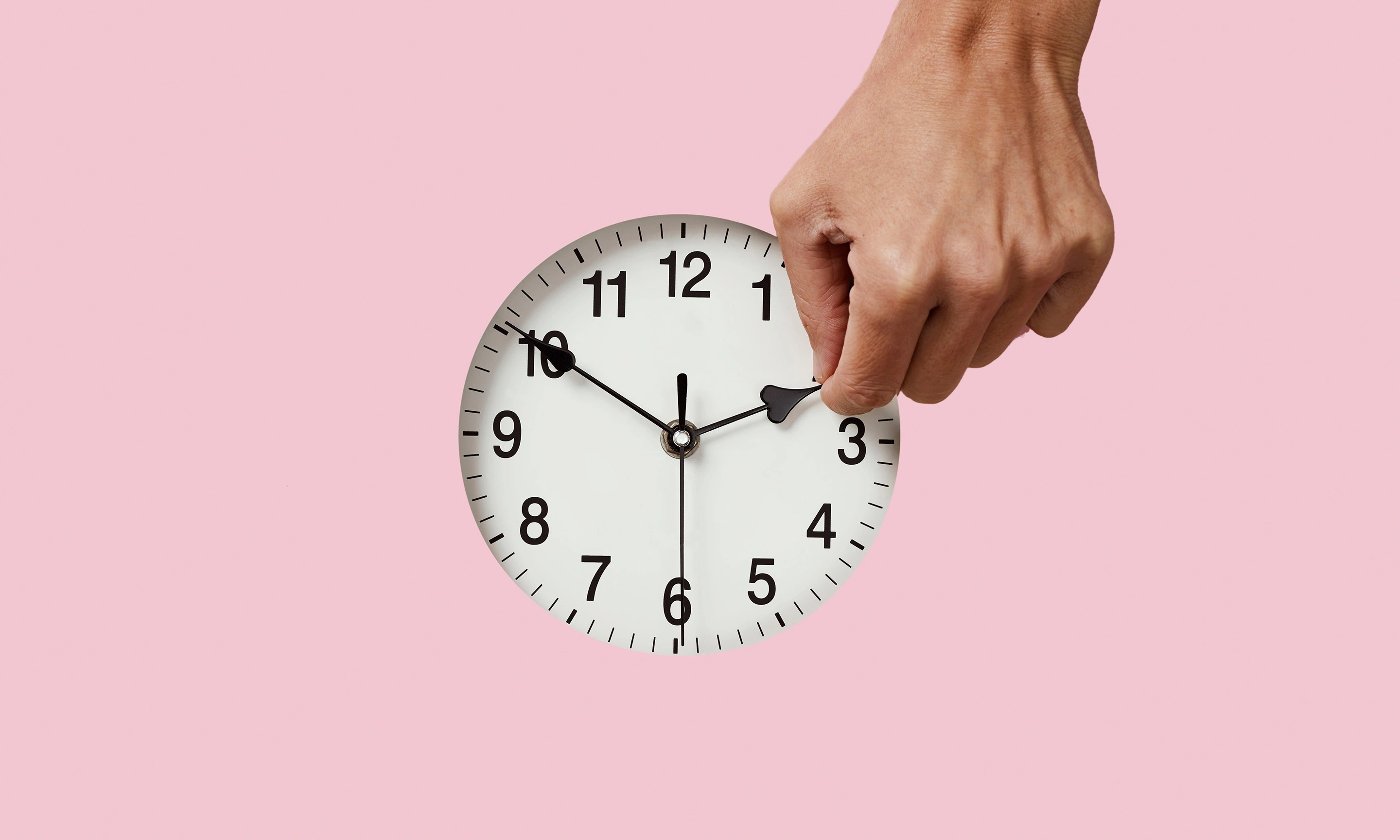
我喜歡秋天的大部分事物,可以觀賞多彩的樹葉,采摘南瓜,還能夠慶祝我的生日。我不喜歡的是時間的變化。我意識到我們“多了”一個小時的睡眠時間(好吧,我們這些沒有小孩的人);然而,我不喜歡下午四點就天黑。
實行夏令時(Daylight Saving Time)起源于20世紀初,這在當時是減少電力使用的一種方式,現在由于其對公共健康和安全的影響而受到批評。2020年,美國睡眠醫學會(American Academy of Sleep Medicine)發表聲明,支持全國固定的全年標準時間,這“最符合人類的晝夜節律生物學,對公共健康和安全大有裨益”。
研究表明,每年秋季回到標準時間會增加不良心血管事件、情緒紊亂和機動車事故的風險。根據美國睡眠醫學會的說法,我們身體內部時鐘的失調與“心血管疾病風險、代謝綜合征和其他健康風險的增加有關”。
因此,美國參議院提議通過《陽光保護法案》(Sunshine Protection Act),完全取消每年兩次調整時鐘的做法,永久實行夏令時。如果該法案在眾議院通過并由美國總統喬·拜登簽署成為法律,它就將于2023年11月生效。
在那之前,注冊臨床心理學家、《女性克服失眠指南》(The Women’s Guide to Overcoming Insomnia)的作者謝爾比·哈里斯博士分享了一些幫助你的身心適應時間變化的方法。
開始早點睡覺
如果你想提前讓自己(或你的孩子)適應時間變化,哈里斯建議在時間變化之前的幾天晚點睡覺。例如,如果你的正常就寢時間是晚上10點,那么試著在周四晚上10點20分就寢,然后在周五晚上10點45分就寢。
哈里斯說:“這樣一來,當我們周六晚上把時鐘撥回去時,你就會晚睡15分鐘,但它會‘神奇地’變成你在時鐘撥回前一周的原始就寢時間。這對孩子們來說尤其有效,但并不是每個人都有足夠的精力做到這一點。”
曬太陽
哈里斯建議:“在早上和白天盡可能多地曬太陽,以幫助緩解時間調整帶來的不適。由于太陽落山的時間較早,所以早上和下午曬太陽有助于更好地調整你的晝夜節律,也可以讓你在下午更有精力。”
改變你的作息時間
“當你在調整就寢時間的時候,試著把吃飯、鍛煉和活動的時間也推遲15分鐘到20分鐘。”哈里斯說。“就寢時間和起床時間并不是我們生物鐘的唯一線索。像運動和飲食這樣的活動也是節律的設定方式。”
為了幫助你在晚上睡得更好,哈里斯建議在你期望的就寢時間前一小時調暗燈光;睡前八小時內限制攝入咖啡因;并且在睡前三小時內限制大餐、酒精、液體和劇烈運動。
保持你現在做的
“如果你不想提前做任何調整,沒問題。”她說。“如果你盡可能保持一致的就寢和起床時間,并注意光照,你就會在5天到7天內調整好。但不要為褪黑素而費心。如果你的睡眠在一兩個星期內沒有調整好,你的睡眠質量和/或時長出現問題,請咨詢一下睡眠醫生,讓你的生物鐘回到正軌。我們可能會建議使用褪黑素,但這取決于個人,通常來說沒有必要。”(財富中文網)
譯者:中慧言-王芳
我喜歡秋天的大部分事物,可以觀賞多彩的樹葉,采摘南瓜,還能夠慶祝我的生日。我不喜歡的是時間的變化。我意識到我們“多了”一個小時的睡眠時間(好吧,我們這些沒有小孩的人);然而,我不喜歡下午四點就天黑。
實行夏令時(Daylight Saving Time)起源于20世紀初,這在當時是減少電力使用的一種方式,現在由于其對公共健康和安全的影響而受到批評。2020年,美國睡眠醫學會(American Academy of Sleep Medicine)發表聲明,支持全國固定的全年標準時間,這“最符合人類的晝夜節律生物學,對公共健康和安全大有裨益”。
研究表明,每年秋季回到標準時間會增加不良心血管事件、情緒紊亂和機動車事故的風險。根據美國睡眠醫學會的說法,我們身體內部時鐘的失調與“心血管疾病風險、代謝綜合征和其他健康風險的增加有關”。
因此,美國參議院提議通過《陽光保護法案》(Sunshine Protection Act),完全取消每年兩次調整時鐘的做法,永久實行夏令時。如果該法案在眾議院通過并由美國總統喬·拜登簽署成為法律,它就將于2023年11月生效。
在那之前,注冊臨床心理學家、《女性克服失眠指南》(The Women’s Guide to Overcoming Insomnia)的作者謝爾比·哈里斯博士分享了一些幫助你的身心適應時間變化的方法。
開始早點睡覺
如果你想提前讓自己(或你的孩子)適應時間變化,哈里斯建議在時間變化之前的幾天晚點睡覺。例如,如果你的正常就寢時間是晚上10點,那么試著在周四晚上10點20分就寢,然后在周五晚上10點45分就寢。
哈里斯說:“這樣一來,當我們周六晚上把時鐘撥回去時,你就會晚睡15分鐘,但它會‘神奇地’變成你在時鐘撥回前一周的原始就寢時間。這對孩子們來說尤其有效,但并不是每個人都有足夠的精力做到這一點。”
曬太陽
哈里斯建議:“在早上和白天盡可能多地曬太陽,以幫助緩解時間調整帶來的不適。由于太陽落山的時間較早,所以早上和下午曬太陽有助于更好地調整你的晝夜節律,也可以讓你在下午更有精力。”
改變你的作息時間
“當你在調整就寢時間的時候,試著把吃飯、鍛煉和活動的時間也推遲15分鐘到20分鐘。”哈里斯說。“就寢時間和起床時間并不是我們生物鐘的唯一線索。像運動和飲食這樣的活動也是節律的設定方式。”
為了幫助你在晚上睡得更好,哈里斯建議在你期望的就寢時間前一小時調暗燈光;睡前八小時內限制攝入咖啡因;并且在睡前三小時內限制大餐、酒精、液體和劇烈運動。
保持你現在做的
“如果你不想提前做任何調整,沒問題。”她說。“如果你盡可能保持一致的就寢和起床時間,并注意光照,你就會在5天到7天內調整好。但不要為褪黑素而費心。如果你的睡眠在一兩個星期內沒有調整好,你的睡眠質量和/或時長出現問題,請咨詢一下睡眠醫生,讓你的生物鐘回到正軌。我們可能會建議使用褪黑素,但這取決于個人,通常來說沒有必要。”(財富中文網)
譯者:中慧言-王芳
I love most things about fall: colorful leaves, picking pumpkins, my birthday. Something I don’t love: the time change. I realize we “gain” an extra hour of sleep (well, those of us without small children); however, I’m not a fan of it being dark at four o’clock in the afternoon.
What began as a way to reduce use of electricity in the early 1900s is now criticized due to its impact on public health and safety. In 2020, the American Academy of Sleep Medicine released a statement in support of a national fixed year-round standard time, which “aligns best with human circadian biology and provides distinct benefits for public health and safety.”
Research has shown that the annual fall back to standard time every autumn includes “increased risk of adverse cardiovascular events, mood disorders, and motor vehicle crashes.” The misalignment with our bodies’ internal clocks has been associated with “increased cardiovascular disease risk, metabolic syndrome, and other health risks,” according to the American Academy of Sleep Medicine.
So much so that the Senate has proposed doing away with Daylight Saving Time altogether with its Sunshine Protection Act, which would make Daylight Saving Time permanent. If the bill passes in the House and is signed into law by President Joe Biden, it would go into effect in November 2023.
Until then, Dr. Shelby Harris, a licensed clinical psychologist and author of The Women’s Guide to Overcoming Insomnia, shares a few ways to help your mind and body adjust to the time change.
Start going to bed earlier
If you want to adjust yourself (or your kids) to the time change in advance, Harris recommends going to bed later in the days leading up to it. For example, if your normal bedtime is 10 p.m., try going to bed at 10:20 on Thursday and then 10:45 on Friday.
“That way on Saturday night when we change the clocks back, you do 15 minutes later, but it ‘magically’ becomes your original bedtime in the week before the change,” says Harris. “This works well for kids especially, but not everyone has the bandwidth to do it.”
Let the sunshine in
“Get as much daylight as you can in the morning and during the day to help ease the adjustment,” suggests Harris. “Light exposure in the morning and afternoon as the sun goes down earlier helps to get your circadian rhythm better aligned and also keeps you more energized in the afternoon.”
Revamp your routine
“Try to adjust meals, exercise, and activities 15 to 20 minutes later as well when you’re adjusting the bedtime,” says Harris. “Bedtimes and wake times aren’t the only cues for our body’s clock. Activities like exercise and eating set our rhythm as well.”
To help you sleep even better at night, Harris suggests dimming lights one hour before your desired bedtime; limiting caffeine within eight hours of bedtime; and limiting large meals, alcohol, liquids, and hard exercise to three hours within bedtime.
Keep doing what you’re doing
“If you don’t want to do anything to adjust in advance, no problem,” she says. “You’ll adjust within five to seven days if you keep a consistent bed and wake time as best as possible and are mindful about light exposure. But don’t bother with melatonin here. If your sleep doesn’t resolve in a week or two and you’re having trouble with sleep quality and/or quantity, talk with a sleep doctor to get your body clock back on track. We might suggest melatonin, but it depends on the person and there’s usually no need for it.”






